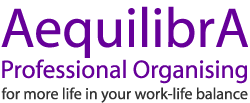
Knowledge is power but information isn't static; it changes and grows so rapidly that we barely have time to organise what we have before it becomes outdated.
The management of information, whether in paper or electronic form, is an increasing problem.
Information can be a burden if you don't know what you have or can't find it when you need it.
It's estimated that the average worker spends 150 hours per year looking for misplaced information.
Knowledge is Power
Information is a valuable resource that comes in different forms and is used for different purposes. Almost everything we do requires the use of information in some form or other. No matter how much or how little information you have, or what form you keep it in, there are many issues associated with managing it successfully:-
- Deciding which form to keep it in - paper or electronic
- Deciding how long to keep it or whether to keep it at all
- Keeping it up-to-date and eliminating it when it's obsolete
- Avoiding unnecessary duplication
- Knowing whether you have the latest version if duplicates exist
- Filing it so that you, or someone else, can find it later
- Finding it after someone else has filed it
- Following up on it in time
- Maintaining confidentiality of sensitive information
- Protecting it against loss by fire, theft, computer failure, computer viruses, etc
- Complying with legislation, eg the Data Protection Act.
Not Worth The Paper It's Written On?
The words "information correct at time of printing" is a clue that by the time the information reaches you it may have been superceded. Information related to certain subjects, eg Law or Technology, can become outdated very quickly.
Obsolete information is worthless and represents risk. Making decisions based on outdated information can lead to wasted time and missed opportunities.
Paper or Electronic?
Despite advances in technology, many people still prefer to have their Diary, To Do list and Contact information in paper form, and it's not uncommon for people to print off their e-mails before they read them.
Paper has obvious advantages: it's portable, easier to read from, and easy to make notes on. Electronic information has advantages too: it's searchable, quick to retrieve, takes up very little space, and is often editable. The last point assumes that you know how to use the features of the software program that created it.
Some people aren't comfortable with technology; they don't trust their treasured information to the mysterious workings of their hard drive, zip disks or rewritable CDs.
Paper and Electronic
Sometimes it's perfectly acceptable to have information in both forms if it's appropriate for your needs. The best approach in some circumstances may be to use the advantages of both.
For example, say you have a meeting with a client somewhere other than your office, and you don't have access to a laptop computer; you could print off a copy of an electronic document, take the printed version with you, make notes on it, then edit the electronic version when you get back to the office. You can then decide whether to keep or destroy the amended paper version.
Using the Right Tools
You're not a technophobe just because you still keep your To Do list on paper, but technology can be invaluable for managing information resources. If you work at a computer for most of the day it's easy to take advantage of programs that alert you to appointments and outstanding tasks.
However, if you're away from your desk for most of the day this wouldn't be of much use. You can allow others access to your electronic diary across the network so they can check your availability, but there's not much point if you don't keep the diary up-to-date.
By all means explore the advantages that technology can provide for managing information but don't feel defeated or embarrassed if you end up resorting to previous methods. Practical methods that suit your needs are preferable to modern ones that don't.
Mobile Information
Just because it's possible to use technology to manage information when you're mobile, doesn't mean you have to. There's no point in struggling to enter an appointment into a PDA (Personal Digital Assistant) that you've never quite got the hang of when you could jot it down with a pen in a diary in a matter of seconds and with far less frustration.
'Inspector Gadget' at the next desk may be able to impress people in the Post Office queue with his latest hi-tech gizmo, but don't be surprised if, in six month's time, that very same item ends up languishing in a desk drawer with a pile of other expensive but redundant 'great ideas'.
There's nothing wrong with using a paper diary/address book to manage your time and contact information; if it works for you that's far more impressive, and considerably cheaper. Working 'on the road' is a challenge in itself; don't make it more difficult by struggling with technology that doesn't make your life easier.

